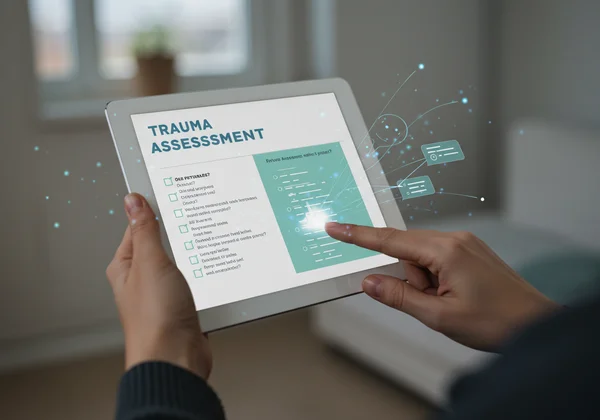Online Trauma Test: Screening vs. Diagnosis Clarified
August 4, 2025 | By Nora Hayes
Feeling overwhelmed by confusing emotions or behaviors? You might be wondering if they stem from past experiences. In the search for answers, an online trauma test can feel like a beacon of light, offering a powerful first step toward clarity. But how do I know if I have trauma? While these tools are valuable, it's crucial to understand what they can and cannot do. Let's explore the key difference between a trauma screening and a professional diagnosis, so you have the accurate information you need to understand your path forward.
Taking steps toward understanding yourself is incredibly brave. A preliminary screening can offer initial validation and direction, helping you make sense of your feelings. It provides a private, accessible way to gain some clarity on your own terms. However, understanding its proper role is key to using it effectively and safely as you explore your emotional health.
Disclaimer: This article is for informational purposes only. The tools and information provided on this platform are for preliminary screening and are not a substitute for professional medical advice, diagnosis, or treatment. If you are in crisis, please contact a local emergency hotline immediately.
What is an Online Trauma Assessment?
Think of an online trauma assessment as a preliminary map, not the final destination. It is a questionnaire designed to help you identify potential signs and symptoms related to psychological trauma. These are not diagnostic tools; instead, they serve as confidential, low-pressure instruments for self-reflection. They help you organize your feelings and experiences into a clearer picture, indicating whether further exploration with a professional might be beneficial.
An online screening acts as a mirror, reflecting patterns you might not have noticed. It can highlight areas of concern, such as intrusive thoughts, emotional dysregulation, or difficulties in relationships, which are common trauma responses. This process helps validate your experiences, reassuring you that what you're feeling is real and deserves attention.

The Purpose of a Preliminary Trauma Screening
The primary goal of a preliminary trauma screening is education and awareness. It is designed to provide you with a snapshot of your current emotional state in relation to common trauma indicators. For many, it's the very first time they connect their present-day struggles—like anxiety or feeling emotionally numb—to past events. Many find this understanding deeply empowering.
A screening helps bridge the gap between silent suffering and seeking help. It gives you a vocabulary to describe your experiences and can reduce feelings of isolation by showing that your struggles are recognized and understood within the field of psychology. It's a foundational step, not a final answer.
How TraumaTest.org Provides Insights
Our platform offers a scientifically designed, 30-question survey that serves this exact purpose. The questions in our free trauma tes are carefully crafted to cover a broad range of potential trauma-related symptoms for both children and adults. Upon completion, you receive an immediate result indicating a low, medium, or high potential for trauma symptoms.
For those seeking deeper understanding, we also offer an optional AI-powered personalized analysis. This feature provides more context about your potential challenges and coping mechanisms. Keep in mind, this feature is also part of the screening process—a sophisticated tool to enhance your self-awareness before you decide on the next steps.
Why an Online Trauma Test Isn't a Diagnosis
This is perhaps the most critical point to understand: a trauma test diagnosis from an online tool is not possible or ethical. A screening identifies potential risk factors based on self-reported symptoms. A clinical diagnosis, on the other hand, is a comprehensive and nuanced medical process conducted by a qualified mental health professional.
Confusing these two can be misleading and even harmful. A screening tool lacks the ability to understand your unique life context, personal history, and the intricate interplay of biological, psychological, and social factors that contribute to your well-being. It is a starting point for a conversation, not the conclusion of one.

Understanding Clinical Diagnostic Criteria
To receive a formal diagnosis for a trauma-related disorder like Post-Traumatic Stress Disorder (PTSD) or Complex PTSD (C-PTSD), a professional uses established frameworks, such as the Diagnostic and Statistical Manual of Mental Disorders (DSM-5). This involves a clinical diagnostic criteria that is far more detailed than any online quiz.
A clinician will conduct a thorough evaluation, which includes:
- A detailed interview about your personal and medical history.
- An assessment of the duration, frequency, and intensity of your symptoms.
- An exploration of how these symptoms impact your daily functioning.
- Ruling out other potential medical or psychological conditions that could be causing your symptoms.
The Risks of Self-Diagnosing Trauma
Relying on an online quiz for a definitive answer carries significant risks. The primary danger of self-diagnosing trauma is misinterpretation. You might conclude you have a trauma disorder when your symptoms are actually related to another condition, like an anxiety disorder, depression, or even a physical health issue.
This can lead to pursuing the wrong kind of support or feeling unnecessary distress. Conversely, a screening might miss the nuances of your situation, causing you to dismiss serious symptoms that require professional attention. Only a trained expert can accurately navigate this complexity and provide a reliable diagnosis. It is always best to avoid misinterpretation by consulting a professional.
The Importance of Professional Psychological Assessment
If an online screening suggests you may have trauma-related symptoms, the next and most important step is seeking a professional psychological assessment. This is the pathway to genuine understanding, healing, and effective treatment. A professional can provide the safe, confidential, and expert space needed to truly explore your experiences.
Moving from screening to assessment is a proactive step toward taking control of your well-being. It transforms general insights from a quiz into a personalized roadmap for healing, tailored specifically to you.

When to Seek Professional Help for Trauma Symptoms
You should consider seeking help if your trauma symptoms are persistent and negatively impacting your life. Ask yourself:
- Are my emotions feeling unmanageable?
- Am I avoiding people, places, or activities I once enjoyed?
- Are my relationships suffering?
- Is it difficult to concentrate at work or school?
- Do I feel disconnected from myself or others?
If you answered yes to any of these, or if a screening tool like a trauma response test indicates a high level of symptoms, it is a strong sign that speaking with a professional would be beneficial.
What to Expect from a Clinical Evaluation for Trauma
A clinical evaluation for trauma is not an interrogation. It is a collaborative and compassionate conversation. A trauma-informed therapist will create a safe environment where you can share your story at your own pace. They will listen without judgment, validate your feelings, and work with you to understand the roots of your struggles. The goal is not to re-traumatize but to gently uncover the information needed to create an effective, personalized treatment plan.
Maximizing the Value of Your Online Trauma Screening
When used correctly, an online screening is an incredibly empowering tool. It's valuable because it opens doors to self-discovery and meaningful conversations. By understanding its purpose and limitations, you can leverage it as a catalyst for positive change in your life.
The key is to view the results not as a label, but as information. This information gives you power—the power to ask better questions, to seek the right kind of help, and to begin your journey toward healing with more confidence and clarity.
Using Your Screening Results as a Conversation Starter
One of the best ways to use your results is as a conversation starter. If you decide to see a therapist, you can bring your screening report with you. It can provide a helpful summary and a concrete starting point for your first session, making it easier to open up.
It can also help you talk to a trusted family member or friend. Sharing your results can be a way of saying, "This is what I've been going through, and I'm ready to understand it better." This can build a stronger support system around you.

The Ethical Stance of Responsible Online Screening Tools
Responsible tools like our psychological trauma test are built on a foundation of ethical principles. This means we are transparent about our tool's purpose as a screening instrument, not a diagnostic one. We prioritize your privacy with an anonymous and confidential experience.
Most importantly, our goal is to empower you with knowledge while consistently and clearly guiding you toward professional resources for definitive answers and treatment. Trustworthy tools exist to support your journey, not to replace the essential role of human connection and expert care. You can begin your journey with us, knowing your safety is our priority.
Conclusion
Understanding your experiences is a courageous and vital step toward healing. Online screening tools like the one we offer are here to serve as a gentle light, illuminating a path forward. They provide valuable, private insights and a starting point for self-discovery. Remember, they are guides, not definitive verdicts. Your true journey to healing is paved with informed steps, and a professional diagnosis provides the clarity needed for tailored, effective support.
Take the next brave step today. Explore your potential symptoms with our free and confidential test, and use that knowledge to connect with a professional if your results suggest further assessment is needed. You are not alone, and understanding is within reach.
Frequently Asked Questions About Trauma Tests & Diagnosis
Can you self-diagnose trauma based on an online test?
No, you cannot. An online test is a screening tool that can indicate the presence of symptoms associated with trauma. A formal diagnosis is a complex clinical process that can only be performed by a qualified mental health professional who can evaluate your full personal history and context.
How do I know if I have trauma, beyond an online screening?
The most reliable way to know if you have a trauma-related condition is through a comprehensive evaluation with a licensed therapist, psychologist, or psychiatrist. They will conduct a thorough assessment to understand your symptoms, their impact on your life, and provide an accurate diagnosis. The screening is just the first step on that path.
What is the most accurate way to get a trauma diagnosis?
The gold standard for an accurate trauma diagnosis is a clinical assessment conducted by a mental health professional specializing in trauma. This involves in-depth interviews, validated diagnostic tools, and a compassionate, expert evaluation of your unique circumstances. A childhood trauma test can offer clues, but only a professional can put all the pieces together for an accurate picture.
What does unresolved trauma look like in daily life?
Unresolved trauma can manifest in many ways. Common signs include persistent anxiety or panic, emotional numbness or detachment, intense mood swings, difficulty maintaining relationships, avoidance of anything that reminds you of the past, chronic physical pain or fatigue, and feeling constantly on edge or unsafe.